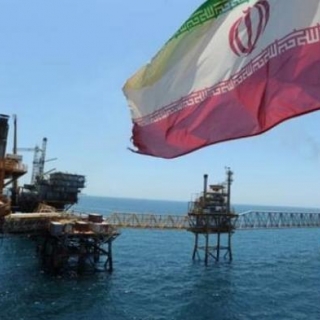


Oil erased earlier gains as fears began to fade of an immediate disruption to supplies from the Middle East, following US strikes on key Iranian nuclear sites.
Global benchmark Brent initially surged as much as 5.7% to $81.40 a barrel in heavy trading, but later dropped below $77. US President Donald Trump said that air attacks over the weekend had "obliterated" a trio of targets in Iran, and threatened more military action if the country didn't make peace. In reply, Tehran warned that the strikes would trigger "everlasting consequences."
The oil market has been gripped by an escalating crisis since Israel attacked Iran more than a week ago, with crude benchmarks pushing higher, options volumes spiking, and the futures curve shifting to reflect fears of a near-term interruption to supplies.
The Middle East accounts for about a third of global crude production, but there haven't yet been any signs of disruption to physical oil flows, including for cargoes going through the Strait of Hormuz chokepoint. Since Israel's attacks began, there have been signs that Iranian oil shipments out of the Gulf have risen rather than declined.
"We are up $10 a barrel since the war started, now a little more, and so I think there is an appropriate amount of risk in the market," said Bob McNally, founder of Rapidan Energy Advisers LLC and a former White House energy official.
"Traders are holding their breath, waiting to see if Israel or Iran expand this conflict beyond military and political targets into traded energy," he told Bloomberg Television. "So far, no one has pulled that trigger — and if they don't, I can see the price reversing."
Bob McNally, Rapidan Energy Group president, says it would be "suicidal" for Iran to completely close the Strait of Hormuz, but he says the country can disrupt the flow of oil in other ways.
The unprecedented US strikes were meant to hobble Iran's nuclear program, and targeted sites at Fordow, Natanz, and Isfahan. At the United Nations on Sunday, Tehran's Ambassador Amir Saeid Iravani said the "timing, nature and scale" of its response "will be decided by its armed forces."
There remain multiple, overlapping risks for crude flows. The biggest of those centers on the Strait of Hormuz, should Tehran seek to retaliate by attempting to close the narrow conduit. About a fifth of the world's crude output passes through the waterway at the entrance to the Persian Gulf.
Two supertankers U-turned away from the strait on Sunday, before subsequently resuming on their original course and heading to transit the chokepoint.
Iran's parliament has called for the closure of the strait, according to state-run TV. Such a move, however, could not proceed without the approval of Supreme Leader Ayatollah Ali Khamenei. Authorities may yet restrict flows in other ways.
Navies in the region have consistently warned about an elevated threat to tankers, though a liaison between the military and shipping said on Sunday that the continued passage of vessels through the Strait is "a positive sign for the immediate future."
"Base case remains that we don't see significant disruptions, neither of oil nor natural gas in the Middle East," Daan Struyven, head of oil research at Goldman Sachs Group Inc., said in a Bloomberg TV interview. "We actually have energy prices gradually declining."
It's not just crude markets being roiled by the the threats to supply. Diesel futures in Europe also surged at the open, touching the equivalent of almost $110 a barrel, before erasing those gains. The Middle East is a significant supplier of barrels to the region.
The crisis will also throw a spotlight onto the Organization of the Petroleum Exporting Countries, and its allies including Russia. In recent months, OPEC+ eased supply curbs at a rapid clip to regain market share, and yet members still have substantial idled capacity that could be reactivated.
Brent for August settlement was 0.5% lower at $76.69 a barrel as of 8:37 a.m. in New York.
The early intraday peak of $81.40 was the highest price since mid-January.
West Texas Intermediate for August delivery fell 0.5% to $73.44 a barrel.
Source : Bloomberg
Oil prices stabilized on Thursday (February 12th), as the market reassigned a risk premium to US-Iran tensions despite US inventory data showing swelling domestic supplies. This movement confirms one ...
Oil prices rose on Wednesday (February 11th), supported by a combination of geopolitical risk premiums from US-Iran tensions and more solid Asian demand signals particularly from India which helped ea...
Oil remained in the green zone on Tuesday (February 10th), as the market refused to abandon the Middle East risk premium. As of 13:07 GMT (20:07 WIB), Brent rose +0.4% to $69.32/barrel, while WTI rose...
Oil prices fell about 1% on Monday as concerns about conflict in the Middle East eased slightly. The market calmed after the US and Iran agreed to resume talks on Tehran's nuclear program, reducing fe...
Oil prices moved slightly higher in a volatile session on Friday, as investors assessed the direction of nuclear negotiations between the United States and Iran. Price movements appeared sensitive to ...
Oil prices stabilized on Thursday (February 12th), as the market reassigned a risk premium to US-Iran tensions despite US inventory data showing swelling domestic supplies. This movement confirms one thing: geopolitical headlines are still more...
Gold prices weakened slightly on Thursday (February 12th), as more solid US employment data reduced market confidence in an imminent Federal Reserve interest rate cut. The strong employment data prompted market participants to shift expectations of...
The Hang Seng Index reversed its downward trend in Hong Kong on Thursday (February 12th), weakening by around 0.9% to around 27,000 after a strong session earlier. This decline halted the momentum of the short term rally, as investors began to...